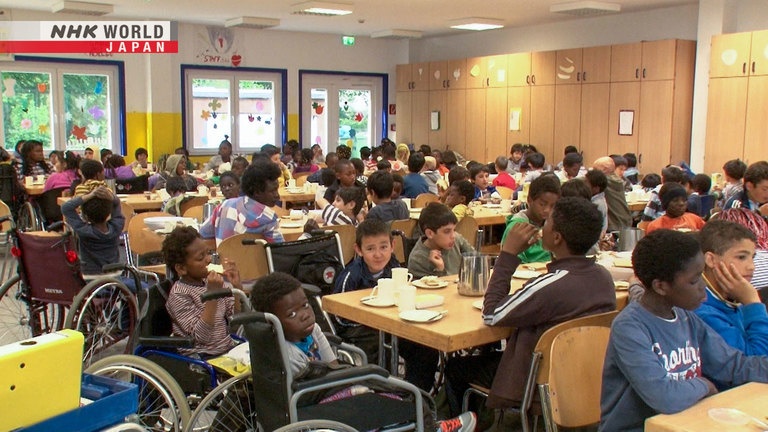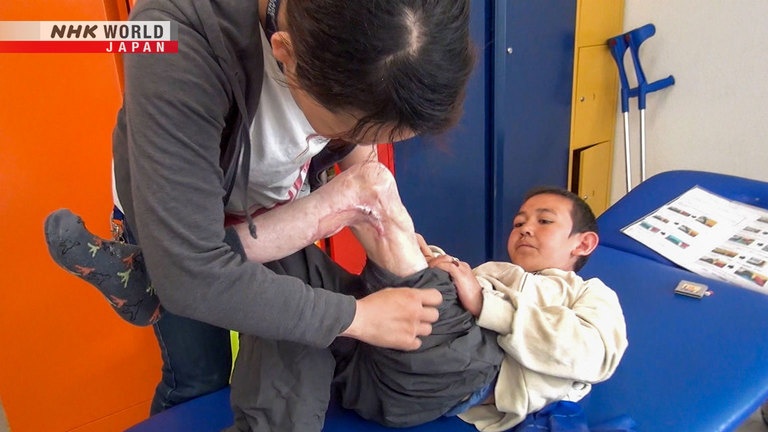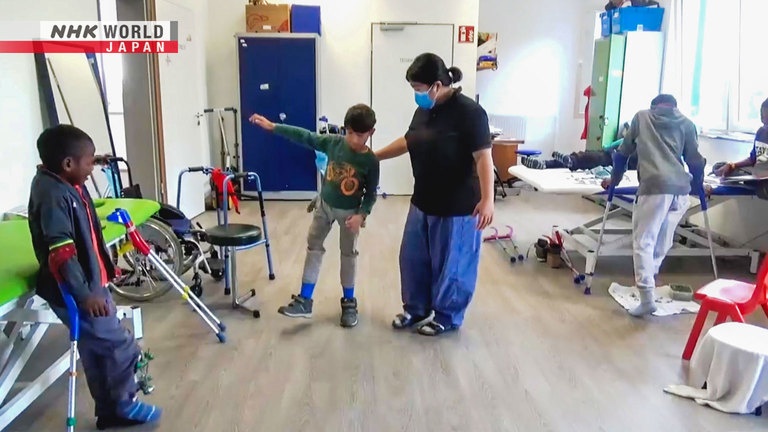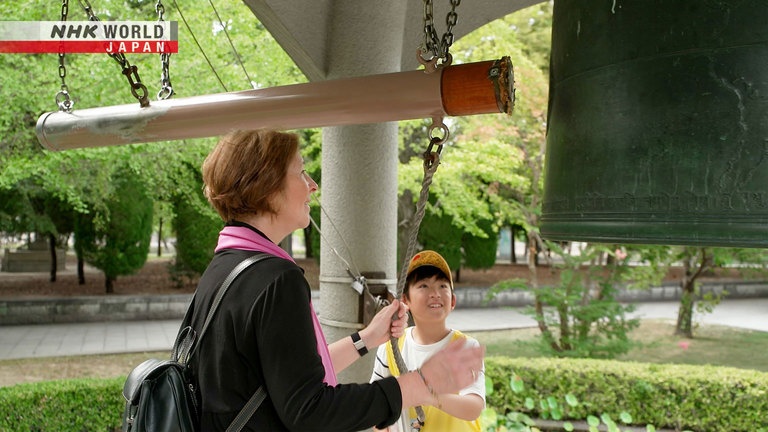Resonate Around the World! Bells of Peace: Birgit Stifter / Director, Friedensdorf International
Friedensdorf International takes sick and injured children from war zones to Germany for treatment and rehabilitation. Director Birgit Stifter explains its activities on a visit to Hiroshima Prefecture.




Transcript
Direct Talk
Hiroshima, Japan, August 2023.
Hiroshima
August 2023
A German woman is visiting
Hiroshima Peace Memorial Park.
Hiroshima Peace Memorial Park
She's Birgit Stifter,
the Director of Friedensdorf International.
It's the first time she has faced
the scars of the atomic bomb.
Just looking at this dome is not enough.
We must also take action.
There is always war and conflict
somewhere in the world,
and it is children
who are the greatest victims.
The German organization
Friedensdorf International
takes sick and injured children to Germany
for treatment and rehabilitation
and then returns them
to their home countries.
Birgit Stifter, the new Director,
decided to visit Hiroshima.
Peace!
Peace! Peace!
Peace! Peace! Peace!
I feel there's the same sadness
and desire for peace
in both Japan and Friedensdorf International.
It was that common desire
that led me to come to Hiroshima.
Thoughts of peace
will be dispatched from Hiroshima.
Resonate Around the World! Bells of Peace
The countries whose children we help
are all war zones or former war zones.
However, not all the children
can be taken to Germany.
Afghanistan (2021)
The Friedensdorf has
certain entry conditions.
The child must have an injury or illness
that cannot be treated in their country,
have a good chance of recovering in Germany,
be in financial need, and have a family
that can accept them after treatment.
All the gathered children are examined.
Temporary medical clinic
9-year-old Baja was severely burned
in a gas explosion.
The fingers of his right hand
were melted away,
and he cannot close his right eye.
We'll take him to Germany.
Please get him ready immediately.
6-year-old Ami broke a bone when he fell over.
Many malnourished children
apparently suffer broken bones.
He'll be treated in Afghanistan.
Deciding whether or not
to take children to Germany
is a tough decision every time.
Unfortunately, there is
a lot of suffering in the world,
especially amongst children.
Friedensdorf International alone
cannot reduce it.
That is why we must focus
not only on the suffering,
but on how we can help the children.
156 children from 8 countries are
currently staying at Friedensdorf.
Children with different nationalities,
religions, and cultural backgrounds
live together for between
six months to one year,
and undergo a rigorous
rehabilitation program.
There are no borders between children.
Here they will learn the
"meaning of peace."
All we can do is provide a place
where children can feel safe and be children.
Then they will develop friendships
that transcend national borders.
My favorite part of our activities
is the children's last day in Germany
when their treatment has ended
and they can return to their home country.
We're going home! We're going home!
They shout "We're going home!"
in a loud voice.
The staff and even the children
who are staying for more treatment cry out.
All the children will return home safe,
healthy, and with a better
perspective on life.
That is what drives my work.
Friedensdorf International was founded by
the citizens of Oberhausen in Germany in 1967,
during the Vietnam War.
It's said that the strong desire to
"save children injured on the battlefield"
is to make up for
the actions of Nazi Germany.
All its operations are funded by donations,
and in its 56 years of operation,
it has saved the lives of more than
40,000 children from 40 countries.
We have lasted because
the world still needs us.
We've been supporting Afghanistan
since 1987, and Angola since 1994.
We've been able to save so many children
because of these long connections.
Birgit studied social welfare at university
and joined Friedensdorf International in 2000,
wanting to work in development cooperation.
I wanted to be involved in helping children
because I grew up in a large, noisy family
which was always eating and fighting!
Such an environment that values family
and friends got me into this work.
But even since she joined
Friedensdorf International,
the number of conflicts
around the world has grown.
Birgit finds it hard to be involved
in conducting its activities.
The hardest part
is having to accept inconvenient ideas
that are changed by war.
Back in 2000, a certain foundation
had pledged nearly 100,000 U.S. dollars
for the treatment of Afghan boys.
However, after the 9.11 terrorist attacks,
the donation for one boy was withdrawn
because of his nationality,
and he could no longer receive treatment.
And right now,
the war between Russia and Ukraine
is also greatly influencing our activities.
It doesn't affect only us,
but people all over the world.
This war has led to a new debate
in Europe about "war and peace."
In Germany in particular,
with regard to national defense,
there is a growing opinion that
the armed forces should be increased.
And I feel that people's views on
Friedensdorf International are also changing.
We can never end war by force.
I believe that cold wars and nuclear
deterrence are not solutions for humanity.
That is because
people get scared all the time
and become unable to trust anyone.
We must find some different solution.
Birgit says that
in helping children from conflict zones,
there is something we must never forget.
During a war,
aid comes in from all over the world,
but as soon as it's over,
as in Afghanistan, it's forgotten.
Both Angola and Cambodia
now receive no support at all.
It's these forgotten countries
that we continue to support.
Most notable in recent years
is the case of Afghanistan.
The war is over.
But the Afghan people
are becoming increasingly hungry
and there are very few medical facilities.
In other words,
the war goes on and on and on.
For the Afghan nation,
the war is not over yet.
So please help
the forgotten children of this world.
All children are innocent,
and they are our future.
If we do not help these children,
we are putting our world into further danger.
Children's injuries and illnesses
are different during a conflict
and after it is over.
In Afghanistan, just after 9.11, many children
were injured by bullets and landmines.
Now, more and more children
are suffering from extreme malnutrition,
festering wounds, and osteomyelitis.
In Angola as well, where the civil war
ended in 2002, there are changes.
Injuries caused by landmines, gunfire,
and gas explosions are decreasing.
But more and more children are being born
with genetic abnormalities,
such as congenital deformities
in the urinary and orthopedic systems.
Just because the war has ended
does not mean everything is back to normal.
I think the people here in Hiroshima
know that best,
as do the people of Afghanistan and Angola.
Even after the actual
military conflict is over,
people's daily lives remain
under the shadow of war.
Birgit's trip to Hiroshima this time
seems to have raised
many thoughts and feelings.
This is what humans do to other humans.
The children are blameless,
and if we do nothing about it,
the world will end up
like this again someday.
Ogura Keiko was eight
when she was exposed to atomic radiation.
Up to the moment of delivery, I worried
whether I could have a healthy child.
All the A-bombed women felt the same.
Seto Mayu,
a third-generation A-bomb survivor,
is campaigning for
the abolition of nuclear weapons.
We can't undo what has already happened.
The existence of places like this,
with their memorial monuments,
is undeniably tragic.
Nonetheless,
what truly matters is
the passing on of the desire
for peace to the younger generation.
Our common goal
should be to convey the message
of anti-nuclear weapons
to the younger generation.
The most memorable person
on the trip was Sasaki Shun,
who guided Birgit to the Peace Bell.
Shun's great-grandmother, who was exposed
to the atomic bomb at the age of 12,
later suffered from breast and colon cancer.
She passed away at the age of 69.
Shun tells tourists from overseas about
the horror of the atomic bombing in English.
Shun represents hope.
He presented me with a paper crane.
He gives a crane to many people.
Each person who receives one
will become an ambassador of peace
if they pass on his message.
Children who have returned home
from the Friedensdorf
are also now working as Ambassadors of Peace
in their respective countries.
Here in Hiroshima, I've been impressed
by the "Never give up!" spirit,
and I will take that message back with me.
Despite the great sadness and hardships
they've experienced,
there's a strong will among the friends
I've met here never to give up,
and to continue their peace activities.
Wars occur because people simply
don't want to comprehend the tragedy of it,
and because very few people are
willing to face the fear of war and crises.
Our knowledge is often
limited to reading textbooks.
If you visit the museum in Hiroshima,
and talk to the local people,
it's impossible to evade the horrors of war.
We have an obligation to show
what war really means.
That's precisely why we still exist.
All we can do is continue to tell the story.
Our ultimate goal is to create a world
in which Friedensdorf International
is no longer needed.
When the world no longer needs us,
it will mean that
the world has achieved health and peace.
That will be when the world is free
of war and crisis situations.
If such a world can be realized,
we can rejoice wholeheartedly,
even if we have to lose our jobs.
Finally, we asked Birgit to share her motto.
Peace for all people!
I earnestly wish for peace for all.
Not just for the lucky few, but for everyone.
I believe that peace is not only
the absence of war and violence,
but also a situation in which everyone
can enjoy a proper education and good health.